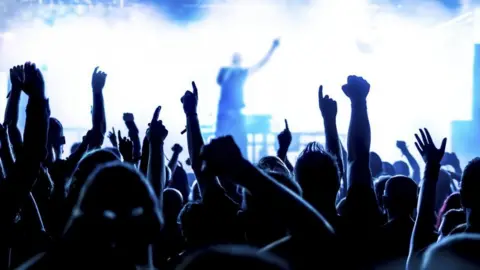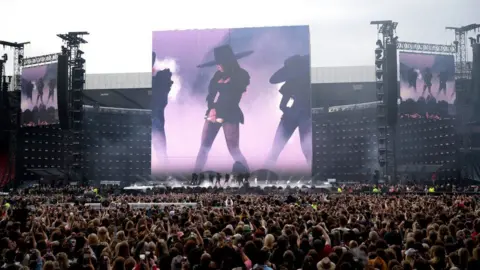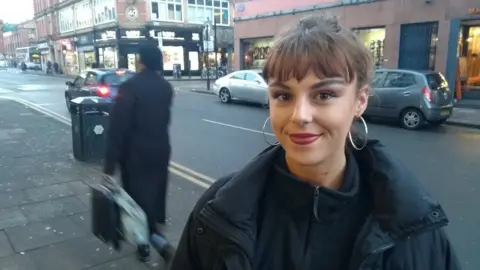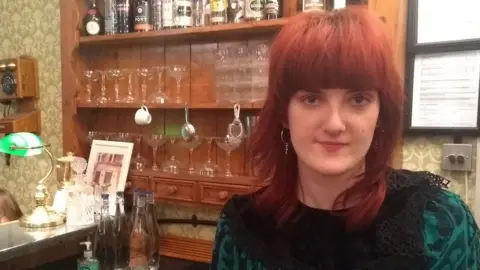Gig ticket prices have doubled since 1990s
 Thinkstock
ThinkstockAverage ticket prices for big arena gigs have doubled since the late 1990s, the BBC has found.
Taking inflation into account, prices have risen by 27%.
BBC 5 live's Wake Up to Money studied data from the National Arenas Association, which tracks prices across 21 venues.
It shows ticket prices - at the face value set by the promoter, rather than secondary websites - rose far faster than inflation between 1999 and 2016.
The average ticket cost £22.58 in 1999 (£37.20 at today's prices) and rose to £45.49 in 2016, (£47.14 today) the most recent year with available data.
The figures support anecdotal evidence gathered by the programme of sharp price rises for the biggest shows.
In 1998 it cost £23.50 to see the Spice Girls at Wembley Stadium (about £39 in today's money).
When Taylor Swift plays the same venue in June, ticket prices will range from £55 to £120.

The live music industry claims the big tours have become far more ambitious, and cost far more to stage as a result.
John Corr's company, Sound Moves, handles logistics for some of the world's biggest tours, working with acts including Madonna, the Rolling Stones and Beyonce.
He told the BBC: "People complain about the cost of the tickets... but when they understand the scale of what goes on in the background they begin to get an understanding of why we've got to the cost we have.
"People's expectations keep rising - do they want a musical performance or do they want a show?
"With Beyonce, when the Formation tour was announced, demand was huge and they extended it in the US.
"What had been a predominantly ocean [freight] solution to get it to the start of the European tour in Sunderland needed to have increased air freight... We flew five 747s, which was the core show, into Prestwick and two 747s of stage components into Doncaster."
Live music has also become a more important source of revenue for performers, with the rise of downloads and streaming.
Those sources garner less cash than physical formats and together accounted for 62% of all expenditure last year, according to the Entertainment Retailers Association.

A straw poll in Manchester found gig-goers either priced out of buying tickets or shouldering higher costs.
Metal fan Andrew, said: "I saw Metallica at the Manchester Arena in 2009 for £40. I think the last gig was £80 or £95 for a standard ticket.
Another music fan, Ellen, told the BBC: "I only go to an arena gig once or twice a year because I can't afford it."
Do any of her friends go frequently? "Only if their parents have bought their tickets."
The Music Venue Trust said the average cost of a "grassroots" gig has barely changed in 20 years at around £8, and that's helped to pull down the overall cost of all live music.
The Office for National Statistics includes gig-going when it measures inflation and says the cost of concerts - of all sizes - has broadly tracked inflation over the past decade.

Industry data from Pollstar shows average ticket prices for the top 100 worldwide tours last year rose by 5% to $84.63 (£61).
Overall, the amount of money taken by the biggest acts has jumped by 33% to $5.65bn since 2011, and higher prices haven't put off the punters, according to Pollstar.
It said worldwide ticket sales are up 23% since 2011 to 66.8 million.
Paul Hutton is a promoter whose business Crosstown Concerts has worked with acts such as Noel Gallagher, Nick Cave and Snow Patrol.
He said production costs are rising and the music industry has become more regulated. "Fifteen years ago it was a black economy, now everyone's taxed and VAT-registered, they have to sort out staff pensions. But it can be like a game - everybody looks at everybody else's prices and says, 'If it's £35 for them but we're bigger so we can be £37.50.'"
With wages stagnating - growth of about 2% compared with inflation of 3% - why is demand for tickets still high? Paul suspects fans prioritise certain gigs and cut their cloth accordingly.
"Bar take is down, merchandising is down. People still want the experience of going to the shows but alter part of that experience. The public are arriving later, going somewhere they can get some beers at half the price."
